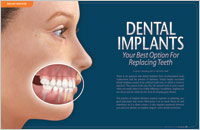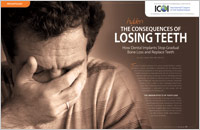If you have a missing tooth, you are probably considering whether a dental implant will be suitable for you. To help you think it through, we’ve compiled a list of pros and cons associated with dental implants. In many ways, implants have great advantages over alternatives such as a bridge or denture. However, everyone is unique, and for some there can be downsides to having a dental implant. We hope this guide will help you make an informed decision.
Unlike a denture, an implant does not move around. It is fixed into the mouth via false roots and will not come loose. Two benefits of having an implant are that you do not need to go through the rigmarole of taking your tooth out to clean it separately, or sticking it in place with a product designed to prevent slippage.
As a denture can become loose, it can cause embarrassment and discomfort. Slurred speech can be the result of a loose false tooth, and eating may be difficult. You cannot usually bite down on a denture when eating. With an implant, you will be able to eat normally, just as you did when you had a real tooth in place.
Although the crown of an implant has to be replaced every ten to fifteen years, the implant itself should last a lifetime with proper care.
Break down biofilm with PerioRenew
Unhealthy gums can dramatically impact more than just your smile. Learn more about this revolutionary new gel for gum disease.
sponsored ad
An implant is similar to a real tooth. It can be cleaned in the same way along with real teeth. This provides better oral health than a bridge, which is attached to another tooth, or both side teeth, leaving no gap in which to closely attend to cleaning.
With a dental implant, you will feel confident enough to smile broadly, eat in public, kiss and talk without being worried that your tooth will come loose.
A bridge or a denture could be uncomfortable and feel unnatural. A dental implant will feel natural and normal.
If you have a bridge, the two teeth either side of it will be shortened in order for caps to go over them, as this is how the new false tooth stays in place. If you have an implant, none of your other teeth will be damaged in this way.
When a tooth is missing, the teeth either side of the gap produced may begin to slip and become crooked. A dental implant can prevent this. It can also stop bone loss and your jaw from shrinking.
Dental implants can be quite expensive and they are not usually covered by dental insurance.
Having a dental implant is classed as surgery. Such surgery is not risk free and can result in bruising, swelling and tenderness.
The procedure of having a dental implant takes far longer than having a bridge or denture. There is preparation time and after care to be considered, which involve quite a few visits to the dentist.
Unlike a denture or bridge, which should last as long as they are cared for, the crown of a dental implant needs to be replaced every ten to fifteen years.
Although most dental implants are successful, there is a risk of failure. If fixtures are fitted incorrectly, the result can be an infection. When placed into thin bone dental implants can become loose. Nerve impairment is a possibility. This can lead to pain, tingling and numbness.
Periodontists suggest that you shouldn’t have a dental implant if you suffer from a crippling disease, are pregnant, have a serious mental health condition or don’t feel you’ll have sufficient motivation to attend required treatment and follow up sessions in full.
Looking at the pros and cons in depth can help give you a good idea about whether you are a suitable candidate for a dental implant. Your dentist should also be able to help you make the right decision.
Reference: dentalimplants.uchc.edu
 Dental Implants – Your Third Set of Teeth
Dental Implants – Your Third Set of Teeth
A discovery fifty years ago paved the way for one of dentistry’s most exciting, natural looking and successful tooth replacement systems. Learn how dental implants might just possibly change your life… Read Article
 The Hidden Consequences of Losing Teeth
The Hidden Consequences of Losing Teeth
For those missing even one tooth, an unsightly gap is actually the least significant problem. What’s of far greater concern is the bone loss that inevitably follows tooth loss. Dental implants fused to the jawbone can preserve bone, improve function and enhance psychological well-being. Learn how implants serve both as anchors to support replacement teeth, and preserve bone as one of the better preventive maintenance procedures in dentistry… Read Article
 Dental Implants – Evaluating Your Options for Replacing Missing Teeth
Dental Implants – Evaluating Your Options for Replacing Missing Teeth
As we guide you through the marketing hype you’ll see that well planned implants most often require a team approach in assessing whether they’re right for you. Not only are they a better treatment choice, they will last longer, possibly a lifetime, making them the right choice and the most cost effective option long term… Read Article
 Implant Overdentures for the Lower Jaw
Implant Overdentures for the Lower Jaw
Implant overdentures represent a major change for the dental profession and the public. The lower jaw two-implant overdenture may be considered a more appropriate starting point over regular dentures… Read Article

